Stress is related to headaches, heart trouble, sleep deprivation, and irritability. In honor of Stress Awareness Day today (April 16), Dr. Locke wants to discuss another condition often caused by stress—TMJ dysfunction. Understanding this disorder will help evaluate the cause of your discomfort and determine how Dr. Locke can treat your symptoms. Before we explain TMJ dysfunction, take this quiz to see how much you already know about the condition.
1. What does TMJ stand for?
- a. Terrible Migraine Journey
- b. Temporomandibular Joint
- c. Tell My Job
2. What is another word for teeth grinding?
- a. Bruxism
- b. Malocclusion
- c. Apnea
3. What is the field of dentistry that focuses on treating TMJ dysfunction?
- a. Cosmetics
- b. Sedation
- c. Neuromuscular
4. Which of the following is not a common symptom of TMD?
- a. Tooth discoloration
- b. Jaw popping
- c. Neck pain
5. How can Dr. Locke treat TMD?
- a. Surgery
- b. Mouthpiece
- c. Braces
Explanations:
1. B. TMJ stands for temporomandibular joint. Your TMJs are the joints that connect your jaw to your skull’s temporal bone. They allow your jaw to move when you talk, chew, yawn, and open and close your mouth. Temporomandibular joint dysfunction (TMD) occurs when your TMJs become misaligned, creating an imbalance that causes pain, stiffness, and tension.
2. A. Bruxism is the subconscious habit of grinding or clenching your teeth. An estimated one-third of Americans suffer from bruxism. Grinding or clenching your teeth puts extreme pressure and force on your teeth, jawbones, and facial muscles. As a result, you may experience worn teeth, a misaligned bite, muscle strain, and other painful and uncomfortable symptoms.
3. C. Neuromuscular Dentistry is the field that focuses on re-aligning your bite to relieve your pain. Dr. Locke is one of the few dentists in the country to practice both Centric Relation and Neuromuscular Dentistry.
4. A. Common symptoms of TMD include headaches, jaw popping or clicking, neck pain, earaches, difficulty opening or closing mouth, facial tension, tooth wear, and back pain.
5. B. Dr. Locke has studied TMD treatment at the Las Vegas Institute for Advanced Dental Studies and the Pankey Institute. If you have TMD, Dr. Locke will create a custom treatment plan that will restore your bite and re-align your jaw joints. Your Waco dentist may recommend an oral appliance that repositions your jaw and prevents grinding. He may also suggest a variety of relaxation techniques to relieve stress and tension.
Stress is bad for your head, heart, body, and mouth. If you’re overwhelmed, visit Dr. Locke for the treatment you need to alleviate your discomfort. Contact our Waco dentist office at (254) 776-4888 to schedule an appointment for TMJ therapy. We welcome patients from Waco, Woodway, McGregor, Hewitt, and the surrounding Central Texas area.

